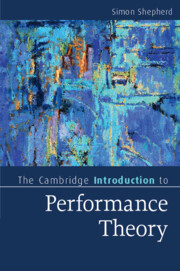Book contents
- Frontmatter
- Contents
- Preface
- Part I Definitions of performance
- Part II The emergence of performance as sensuous practice
- Part III Theorising performance
- 15 Performance, postmodernism and critical theory
- 16 What Performance Studies is: version 1: New York and Northwestern
- 17 What Performance Studies is: version 2: Oral interpretation
- 18 How Performance Studies emerged
- 19 Gender performativity
- 20 Performance and performativity
- 21 The relations between performance, theatre and text
- 22 The magic of performance
- Closing note
- References
- Index
- Cambridge Introductions to …
18 - How Performance Studies emerged
from Part III - Theorising performance
Published online by Cambridge University Press: 05 February 2016
- Frontmatter
- Contents
- Preface
- Part I Definitions of performance
- Part II The emergence of performance as sensuous practice
- Part III Theorising performance
- 15 Performance, postmodernism and critical theory
- 16 What Performance Studies is: version 1: New York and Northwestern
- 17 What Performance Studies is: version 2: Oral interpretation
- 18 How Performance Studies emerged
- 19 Gender performativity
- 20 Performance and performativity
- 21 The relations between performance, theatre and text
- 22 The magic of performance
- Closing note
- References
- Index
- Cambridge Introductions to …
Summary
While Performance Studies may claim itself as a multi- or interdiscipline, a dominant strand of it tells a widely disseminated story of its own emergence within which the commitment to multidisciplinarity does not seem to extend very far. This version of the Performance Studies emergence story repeatedly insists on particular key features and keeps silent about other possible variants.
Canonisation
This can be seen in the earliest, and by now canonical, rendering of the story, as told by Marvin Carlson in Performance: A critical introduction, which appeared in 1996, the year after the First Performance Studies conference. That closeness is not coincidental. The newly institutionalised discipline makes itself felt through the book. Indeed it shapes the understanding of performance, as we shall see.
Carlson's book begins with the general, and laudable, aim of drawing a map, in simple terms, of the various different understandings of the word ‘performance’. Within these, the crucial difference, as Carlson sees it, is between an understanding of performance as ‘the display of skills’ as against a display, not of particular skills, but ‘of a recognised and clearly coded pattern of behavior’. To these he adds a third usage of the term where the emphasis is on how far an activity succeeds ‘in light of some standard of achievement that may not itself be precisely articulated’. This third usage is the one encountered when someone is said to perform well in class or when a product performs well in heavy mud, for example. In this usage a synonym in English might be the word ‘achieve’ or ‘work’ – and if you are not speaking English you could be using an entirely different word that might bear no perceivable connection to the word you use for the first two uses. This accretion of homonyms is quite common in English-language texts about performance, and McKenzie's general theory in Perform or Else (2001) seems to depend on them.
Having laid out these possible usages of the English-language word ‘perform’, Carlson rightly says that it would be futile to look for an ‘overarching semantic field to cover these seemingly disparate usages’ (Carlson 1996: 4–5). And it would be particularly futile, we might note, because the field would turn into separate little horticultural lots as soon as you moved beyond English. It only appears to be a project in the first place if you happen to be an English speaker.
- Type
- Chapter
- Information
- The Cambridge Introduction to Performance Theory , pp. 174 - 183Publisher: Cambridge University PressPrint publication year: 2016



